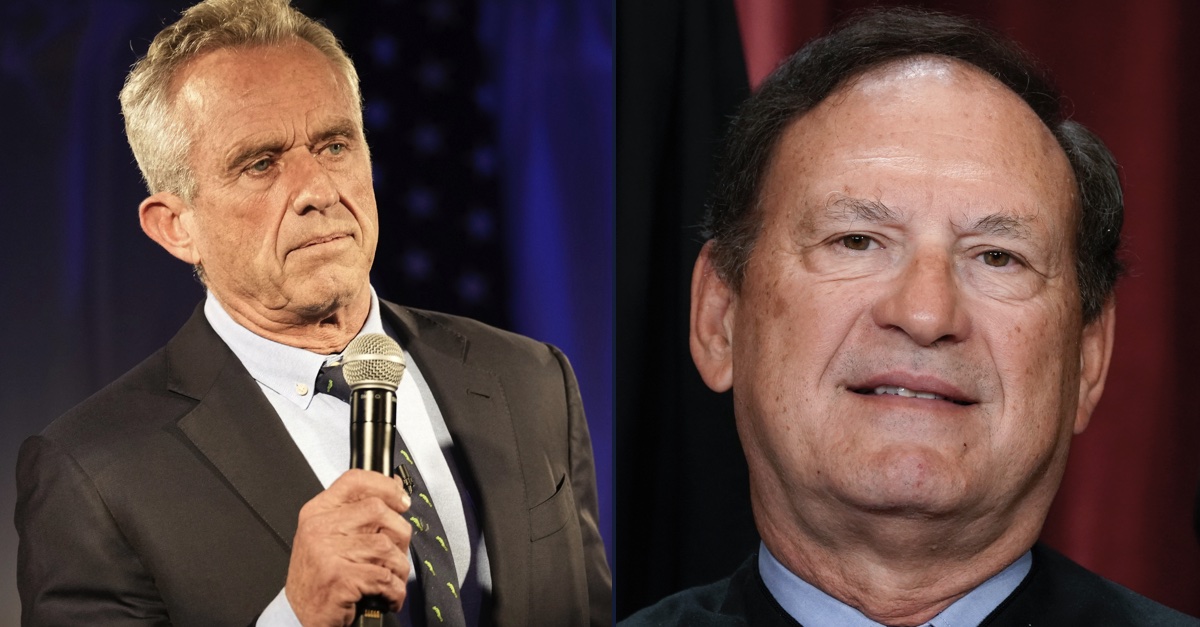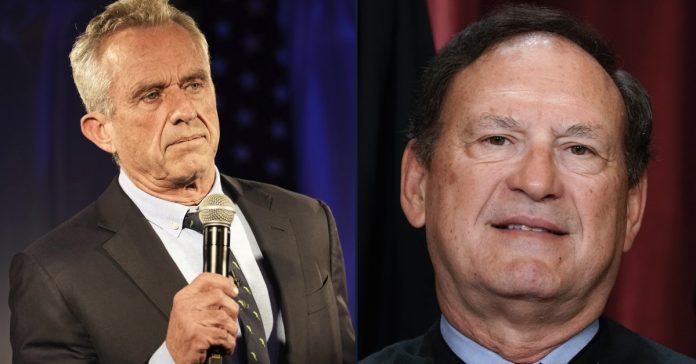
Robert F. Kennedy Jr. speaks during a campaign event, Tuesday, Nov. 14, 2023, in Columbia, S.C. (AP Photo/Meg Kinnard), Justice Samuel pictured on Oct. 7, 2022 (AP Photo/J. Scott Applewhite, File)
Justice Samuel Alito on Monday stood alone in writing that Kennedy family scion Robert F. Kennedy Jr. should have been allowed to intervene in a major Supreme Court social media censorship case.
As Law&Crime reported in September, Biden administration lawyers asked SCOTUS to weigh in after the U.S. Court of Appeals for the Fifth Circuit ruled in Missouri v. Biden that officials in the FBI, CDC, the White House, and the COVID-19 Response Team likely violated the First Amendment by “coercing and significantly encouraging ‘social-media platforms to censor disfavored [speech].””
While the government has argued in Murthy v. Missouri that the Fifth Circuit wrongly interpreted efforts to persuade platforms to remove misinformation and disinformation as coercive or intimidating demands, Kennedy, an environmental lawyer and anti-vaccine activist running as an independent candidate for president who separately sued Google in federal court, filed an amicus brief in September framing the issue in starkly different terms.
“Litigants exaggerate. Nonetheless, it may actually be true that the fate of the freedom of speech in America depends on what the Court does with this case. Social media is ‘the modern public square.’ But today’s public square has gatekeepers — ‘platform gatekeepers’ — a handful of behemoth private companies with unprecedented control over the content of public discourse,” the brief said. “Companies like Facebook and Google decide every day for hundreds of millions of Americans what they are allowed to say, see, and hear. Because these are private companies, the Constitution ordinarily would not apply to their ‘content moderation’ decisions. But as we now know, and as the documentary record in this case demonstrates, the Federal Government has for several years been waging a systematic, clandestine, and highly effective campaign to get these companies to do what the government itself cannot: censor protected speech on the basis of its content and viewpoint.”
In a footnote from the brief, Kennedy “reserve[d] the right to move to intervene […] should the Court grant certiorari.” In October, after the court granted cert in Murthy v. Missouri, Kennedy did file a motion to intervene. A reply brief in support of intervention followed in November.
“The facts of this case, as found by the district judge below, establish that the Federal Government, led by the White House itself, has specifically and successfully sought to censor one of the incumbent President’s leading electoral rivals — to prevent that rival candidate from giving voice in the modern public square to information and ideas critical of Administration policy. Take a moment to consider that,” Kennedy’s reply said, asserting that he had “unassailable” standing. “The constitutional stakes are apparent; the threat to a fair presidential election is apparent. The rival candidate in question — Mr. Robert F. Kennedy, Jr. — is already a party to these proceedings by consolidation below, and his First Amendment rights will be adjudicated by this Court, yet he is not represented here.”
Fortunately for Kennedy, Justice Alito warmed to his arguments. Unfortunately for Kennedy, Alito was the only justice to do so.
In a brief dissent from SCOTUS’ refusal to allow Kennedy to intervene, Alito said the denial “may cause irreparable harm” to a presidential candidate.
“This case concerns what two lower courts found to be a ‘coordinated campaign’ by high-level federal officials to suppress the expression of disfavored views on social media platforms that now serve as the primary source of news about important public issues for many Americans,” Alito began. “One of the alleged victims of this campaign is Robert F. Kennedy, Jr., who is a candidate for President of the United States.”
The conservative justice wrote that the high court’s rejection of Kennedy’s intervention could have far-reaching consequences for the campaign.
“Because Mr. Kennedy’s arguments on the merits are essentially the same as respondents’, allowing intervention would not significantly affect petitioners’ burden with regard to that issue. But the denial of intervention is likely to prevent Mr. Kennedy from vindicating the rights he claims until the spring of 2024 and perhaps as late as June of that year,” Alito said. “And by that time, several months of the Presidential campaign will have passed.”
But the impact could be even worse for Kennedy, Alito said.
“In fact, denying intervention may prevent Mr. Kennedy from obtaining redress for an even longer period. In successfully arguing that we should stay the preliminary injunction entered below, the Government contended strenuously that respondents lack standing,” the conservative justice continued. “If the Court ultimately agrees with that argument and orders that this case be dismissed, our decision will provide little guidance for deciding Mr. Kennedy’s case, and Mr. Kennedy will be required to wait until the District Court separately assesses his claims.”
Writing that Kennedy has a “strong claim to standing” since he has been “mentioned explicitly in communications between the Government and social media platforms,” Alito worried about the “irreparable loss of “Kennedy’s First Amendment rights.
“Our democratic form of government is undermined if Government officials prevent a candidate for high office from communicating with voters, and such efforts are especially dangerous when the officials engaging in such conduct are answerable to a rival candidate,” the justice said. “I would allow him to intervene to ensure that we can reach the merits of respondents’ claims and to prevent the irreparable loss of his First Amendment rights.”
Have a tip we should know? [email protected]

